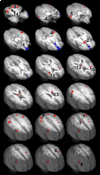Effects of nicotine withdrawal on verbal working memory and associated brain response
- PMID: 20570495
- PMCID: PMC2913712
- DOI: 10.1016/j.pscychresns.2010.04.014
Effects of nicotine withdrawal on verbal working memory and associated brain response
Abstract
Previous literature has reported effects of nicotine withdrawal on brain function during cognitive tasks such as verbal working memory (VWM). Mechanisms of these withdrawal effects have not been clearly identified. Functional neuroimaging offers an objective method to examine brain mechanisms associated with observable behavior and subjective reports. To investigate these mechanisms, 12 smokers were administered a 2-Back VWM challenge during two functional magnetic resonance imaging sessions. Participants abstained from smoking prior to both sessions; however, they applied a nicotine patch before one session and a placebo patch prior to the other. Among regions that exhibited a significant response to the 2-Back during either session, withdrawal was associated with significantly greater deactivation in left and right temporal poles and left medial frontal gyrus. The magnitude of task-related activation showed a significant inverse relationship to craving in the majority of regions during placebo administration. Also, individual brain responses varied more during placebo, suggesting inefficient neural processing. Results suggest that differences in brain response to a VWM challenge during abstinence may be attributed to increased craving. Further deactivation of regions associated with the default network (medial frontal and anterior temporal clusters) during the placebo condition suggests further suspension of default activity, possibly to compensate for inefficient neural processing.
Copyright 2010 Elsevier Ireland Ltd. All rights reserved.
Figures
References
-
- Aloia MS, Sweet LH, Jerskey BA, Zimmerman M, Arnedt JT, Millman RP. Treatment effects on brain activity during a working memory task in obstructive sleep apnea. Journal of Sleep Research. 2009;18:404–410. - PubMed
-
- Atzori G, Lemmonds CA, Kotler ML, Durcan MJ, Boyle J. Efficacy of a nicotine (4 mg)-containing lozenge on the cognitive impairment of nicotine withdrawal. Journal of Clinical Psychopharmacology. 2008;28:667–674. - PubMed
-
- Baddeley A. Working Memory. Science. 1992;255:556–559. - PubMed
-
- Bell SL, Taylor RC, Singleton EG, Henningfield JE, Heishman SJ. Smoking after nicotine deprivation enhances cognitive performance and decreases tobacco craving in drug abusers. Nicotine and Tobacco Research. 1999;1:45–52. - PubMed
Publication types
MeSH terms
Substances
Grants and funding
LinkOut - more resources
Full Text Sources


